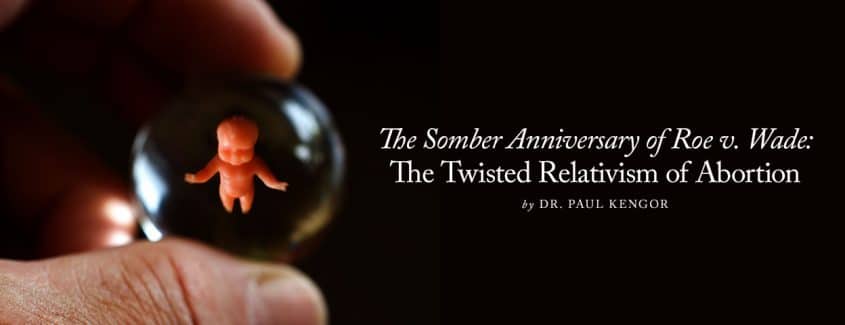
America this week marks the 35th anniversary of Roe v. Wade. The court case is frequently a matter of debate, especially the breathtaking judicial logic on which it is based. The constitutionality of Roe is just one of innumerable facets of the abortion debate, from the legal to the medical to the theological. Consider, however, another facet: the confusing philosophical basis for the assertion that abortion is a woman’s “choice.”
Moral relativism means that truth is not absolute but relative to each and every individual. There is no single, absolute truth, says the moral relativist, but many truths; in fact, there are as many truths as there are individuals with separate definitions as to what is the truth. This certainly undermines Judeo-Christian belief, which says that there is a single, absolute truth that comes from God, not from each individual person.
Nowhere is this clearer than in the convoluted, tragic case of abortion. There are many ways in which pro-choicers are relativists. Most obvious, they do not favor a choice in the case of the father of the child in the womb or the even child in the womb itself; rather, they believe that the choice goes only to one party—the mother alone.
The very issue of the “choice” is completely relativistic—as is the question of its humanity. Who decides whether the life in the womb is a baby or merely a blob of tissue that can be discarded? Who decides if it is a life? The pro-choicer affirms that this decision is not based on medical science, theology, or anything but the mother alone.
Think about the contradictory implications of this assertion: If the mother declares the baby in the womb to be an actual baby, then pro-choicers—especially pro-choice liberals—will go to the mat to defend that mother’s access to the full scope of pre-natal health care. They will loudly denounce and perhaps even sue any insurance company who denies medical coverage to that woman. Any employer who keeps her from going to the doctor is judged a cretin who ought to be penalized, perhaps even assailed as a sexist by Senator Ted Kennedy or boycotted by the National Organization for Women. A compassionate government should provide that care for her free of cost if she cannot afford it.
In this case, obviously, they believe that the object in the womb is a baby that merits nurturing and protection. And why? How so? The answer is anchored in moral relativism: Because this particular mother in this particular case, on her own, by her own decision, declared it a baby.
Yet, if that same woman decided, on her own, almost magically, that the child in her womb is not a baby that merits nurturing and protection, then, presto, she can abort it if she so chooses. This means that the baby is not a baby at, say, conception, or the third trimester, or even once it breathes air, but, alas, is only a baby if the mother says it is a baby. Each individual woman (but never a man) can decide on her own whether and when a baby is legitimately a baby that will breathe the breath of life. The decision is hers. The rest of us, and the child in the womb, are at the mercy of an individual decision that can vary for literally every single woman walking the planet—and that is not an exaggeration.
As former First Lady Hillary Rodham Clinton said in a January 22, 1999 speech to NARAL, the National Abortion Rights Action League, the premier advocacy group for legal, unrestricted abortion: “Being pro-choice is trusting the individual to make the right decision for herself and her family, and not entrusting that decision to anyone wearing the authority of government in any regard.” By Mrs. Clinton’s reckoning, the moral arbiter here is the mother alone—and no one else.
Pro-choice feminists believe that the morally decisive factor in an abortion decision is the mere right to make the decision, a right restricted, but varying in (acceptable) outcome, for each and every prospective mother-to-be. The father cannot be the moral arbiter in this decision because he is not endowed with the legal right of “choice.” The right of reproductive choice is judged the highest moral end in the equation, trumping all other rights, including a right to life for the unborn child.
Does this make sense? Does it seem fair? The result is over 40 million aborted babies in America alone since 1973—not to mention the butchering of a very simple concept, thrown into chaos some 2,000 years ago, when a politician first infamously asked Life itself, “What is truth?”

